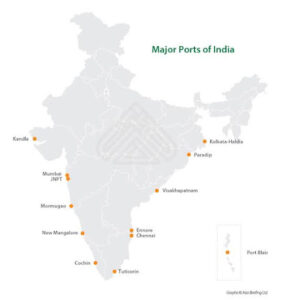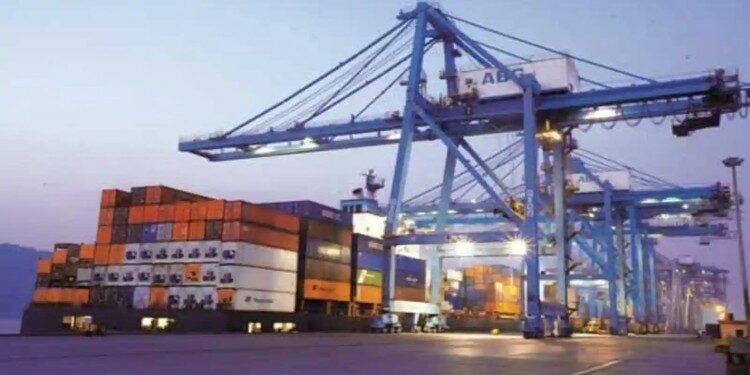Manifest Pedagogy:
Government is set to amend 114-year-old the Indian Ports Act, to bring in reforms.The proposed bill will homogenise and streamline the development of the maritime sector, along with, promoting ease of doing business by eliminating unnecessary delays, disagreements and defining responsibilities.
In News: The Centre recently prepared the Draft Indian Ports Bill, 2022, to do away with the port laws from the British era.
Placing it in the Syllabus: Economy- Infrastructure.
Static Dimensions
- Background
- Status of Indian Ports
Current Dimensions
- Primary objectives of the proposed bill
- Provisions of the Bill
- Significance of the bill
- Issues with the draft bill
Content
Background
- India has a 7,500 km long coastline, 14,500 km of potentially navigable waterways and strategic location on key international maritime trade routes.
- About 95% of India’s trade by volume and 65% by value is done through maritime transport facilitated by ports.
- The Indian Ports Act, 1908 is more than 110 years old.
- It has become imperative that the Act is revamped to reflect the present-day frameworks, incorporate India’s international obligations, address emerging environmental concerns, and aid the consultative development of the ports sector in the national interest.
Primary objectives of the proposed bill
- Promote integrated planning between States inter-se and Centre-States through a purely consultative and recommendatory framework;
- Ensure prevention of pollution measures for all ports in India while incorporating India’s obligations under international treaties;
- Address lacunae in the dispute resolution framework required for burgeoning ports sector;
- Usher-in transparency and cooperation in development and other aspects through use of data.
Provisions of the Bill
- Repealing Indian Ports Act, 1908 –The draft bill seeks to repeal and replace the existing Indian Ports Act, 1908.
- State Maritime Boards-It will incorporate State Maritime Boards in the national framework.
- Non Major Ports– To empower and establish State Maritime Boards for effective administration, control and management of non-major ports in India.
- Maritime State Development Council will ensure cooperative federalism where Centre and State/UT Governments will work together towards preparing progressive road map for the country.
- Pollution– Provide for the prevention and containment of pollution at ports.
- Conservation– Take measures for conservation of ports.
- Penalties– Further, existing penalties in the Act which are outdated have been updated with respect to amounts and offences relevant to present day scenarios.
- Adjudicatory mechanisms– Provide for adjudicatory mechanisms for redressal of port related disputes and to establish a national council for fostering structured growth and development of the port sector
Significance of the bill
- Instil confidence– This bill will help in instilling confidence among more players thereby increasing their participation and promoting healthy competition in the maritime sector.
- Boost Economic activity– It will lead to increased economic activity, wider markets, and a significant increase in associated employment possibilities, resulting in achieving the vision of Atmanirbhar Bharat of Prime Minister
- Compliance– To ensure compliance with the country’s obligation under the maritime treaties and international instruments to which India is a party.
- Level Playing Field– The bill seeks to create a level-playing field for all ports as major ports act under the aegis of central regulations while non-major, especially private ports, function through respective state maritime boards and local legislations.
- Optimum utilisation of coastline– To ensure optimum utilisation of the coastline of India, as may be necessary, and to provide for matters ancillary and incidental thereto, or connected therewith.
Issues with the draft bill
- Against Federal spirit– The revised Indian Ports Bill, 2022 has not addressed the concerns about the Centre usurping the powers of the states, while adding stringent measures such as the powers to make a port or part of it non-operational.
- States had opposed the earlier version of the bill because the provisions relegated them into a secondary position. But the latest draft does not seem to address the issues raised by them.
- Powerful Centre– The composition of the apex Maritime States Development Council appears to be heavily loaded in favour of the Centre.
- All final binding powers rest in the hands of the chairperson, who, according to the proposed amendment, is the Union minister of ports.
- Potential misuse– The government has been empowered to make any port or part thereof non-operational for any other reason it deems fit.
- Such a provision provides an unbridled power to the government and does have some potential for misuse.
- Missing Provisions-The provisions relating to the safety and security of ports have been deleted in their entirety.
- Executive over Judiciary – State governments have now the power to suo moto review any decision of the state maritime board. Such a power adds an executive layer to an otherwise judicial process.
- Private Sector involvement missing– The lack of provision of participation from the private sector, whose role in the port sector has been growing over the last decade
Status of Indian Ports:
- There are 12 major ports and over 200 non-major and minor ports in India.

- Ports in India are classified as Major and Minor Ports according to the jurisdiction of the Central and State government as defined under the Indian Ports Act, 1908.
- Up to 100% Foreign Direct Investment (FDI)is allowed under the automatic route for port and harbour construction and maintenance projects.
- Administration: Major Ports are under the Union list (owned and managed by the central government through a board of trustees) while minor ports are under state administration.
- Each major port is governed by a Board of Trustees appointed by the Government of India.
- Jawaharlal Nehru Port (JNP) has become the first major 100% landlord port in India, having all berths being operated on the PPP model.
Way Forward
- Planning that is scientific and consultative, with a close eye on the ever-increasing safety, security, and environmental challenges, is necessary to support the ongoing advancements and committed investments (public and private) in ports.
- Under the aegis of the Sagarmala project of the Ministry of Ports, Shipping and Waterways, several initiatives on port-led development have been identified and launched.
Mould your thoughts
- The draft India Ports Bill 2022, seeks to amend and consolidate legislation for containment, prevention of pollution and facilitate compliance with the country’s maritime treaties and international instruments. Examine. (250 words).
Approach to the answer
- Introduction about the bill
- Provisions of the bill and its objectives
- Significance / importance of the bill
- Issues with the bill
- Way Forward and Conclusion
















